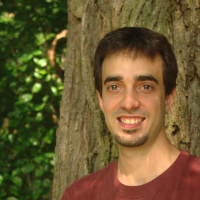Updated: December 3, 2015

Nicolas Pelaez Restrepo
CBC Scholar: Class of 2011
PhD Candidate, Department of Molecular Biosciences and Department of Chemical and Biological Engineering, NU; Advisors: Richard Carthew (Molecular Biosciences) and Luis Amaral
(Chemical and Biological Engineering)
CARTHEW LAB WEBPAGE
AMARAL LAB WEBPAGE
RESEARCH INTERESTS:
Development of animal organs and maintenance of adult health requires that undifferentiated cells transit from multipotent progenitors to differentiated cells that acquire an adult identity. Proper regulation of the progenitor to differentiated cell transition is critical since errors in this developmental decision can cause adult organ mispatterning or diseases such as cancer. Biochemical networks dictate developmental decisions regulating the abundance and activities of molecules required to specify such decisions. Mutations, random fluctuations in the abundance of network components or environmental perturbations can affect biochemical networks, compromising the ability for cells to correctly transit from a progenitor to a differentiated state at a given time or position in a developing tissue. Given the possibility of such perturbations, it is still unknown how biochemical networks can safeguard cells against incorrectly switching from a progenitor to a differentiated state during organ development.
During fly retina pattering each compound eye repeats hundreds of times, in a stereotyped fashion, the transition from eye stem-like progenitors to differentiated cells, creating a regular pattern occurring all over the adult eye. I use the developing fruit fly eye as a model to study how a biochemical network can safeguard cells against genetic or environmental perturbations that could disrupt the normal transit from stem-like progenitors to differentiated cells. I am combining genetics, microscopy, image processing and computational modeling to quantitatively study how the architecture and dynamics of a biochemical network can robustly regulate of the progenitor to differentiated cell transit. These studies could shed light into systems-level principles that cells use to properly regulate developmental decisions. My thesis could also provide insights into how changes in the organization of a network could result in loss of the ability to robustly regulate developmental decisions.
PUBLICATIONS:
Peláez N, Gavalda-Miralles A, Wang B, Navarro HT, Gudjonson H, Rebay I, Dinner AR, Katsaggelos AK, Amaral LA, Carthew RW. Dynamics and heterogeneity of a fate determinant during transition towards cell differentiation. Elife. 2015 Nov 19;4. [Epub ahead of print] (PubMed)
Boisclair Lachance JF, Peláez N, Cassidy JJ, Webber JL, Rebay I, Carthew RW. A comparative study of Pointed and Yan expression reveals new complexity to the transcriptional networks downstream of receptor tyrosine kinase signaling. Dev Biol. 2014 Jan 15;385(2):263-78. (PubMed)
Peláez N, Carthew RW. Biological Robustness and the Role of MicroRNAs: A Network Perspective. Curr Top Dev Biol. 2012;99:237-55. (PubMed)
AWARDS:
- HHMI International Student Research Fellowship (Howard Hughes Medical Institute) 2011 (read more)
- CBC Scholar 2011-2012
- NU IBiS Travel Award (NU); 2010-2011
- Malkin Scholar Award (Robert H. Lurie Comprehensive Cancer Center, Northwestern University); 2010-2011
EVENTS / MENTORING / TEACHING:
- Judge, Chicago Public Schools Student Science Fair, March 2012
- Capturing the Beauty of Science (scientific photography competition; results not released yet)
- Teaching Assistant: Development and Evolution of Animal Body Plans, (Supervisor: Carole LaBonne); and Biochemistry and Molecular Biology (Supervisor: John Mordacq, 2010)
- Mentoring: I have mentored two summer students that are working under my supervision.
